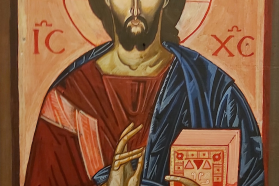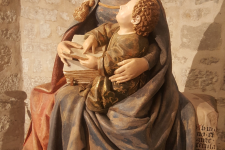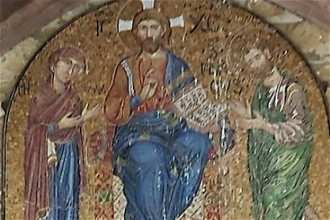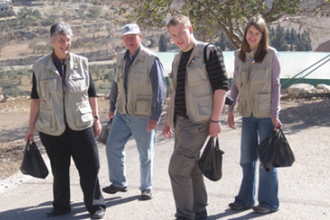Sunday Reflection with Canon Robin Gibbons - 12 September 2021

Forgive a personal introduction, but it will make sense! I am glad I am merging my calling as an Eastern Catholic with a return to my love of the Benedictine spirit, having transferred to the Greek-Catholics from my abbey, I now return as an affiliate-Oblate of the Monks of Turvey, a community, that with the Nuns, has a rich tradition of openness to ecumenism. Their founder Abbot, Dom Constantine Bosschaerts had a vision of new forms of monastic witness with a deep connection to Eastern Christianity and the necessity of dialogue between the Christian traditions of East and West. The Benedictine Congregation of Monte Oliveto to which they belong, has a number of monasteries involved in this outreach, so as I learn what retirement means, from leading a very active life of academic teaching, writing, research, coupled with a deep involvement in ecumenism and pastoral work as a priest, there is a real sense of losing a whole manner of life, and loss is hard. But there is the gain, my old monastic vocation resurrects itself in a new way.
There it is, the link I promised would come, for in our Gospel Jesus teaches us that we will have to lose our lives in order to find new enrichment in a different form of life, so the following words about the condition of discipleship are very real to me at the moment: "Whoever wishes to come after me must deny themself, take up their cross, and follow me. For whoever wishes to save their life will lose it, but whoever loses their life for my sake and that of the gospel* will save it."
(Mk 8: 34,35)
Does that sound easy? I am sure each one reading this will find a similar moment on their journey. We can pick up the theme of denying oneself as a means to achieve something else, such as travelling light to go further, quicker, but in this case problem words from our gospel intrude, we read 'take up our cross' and losing life not only for the Lord but for the sake of the gospel, the good news! What does this all mean? Let's go back a few sentences. In Mark the text we are using begins with one of the most important questions in the scriptures, Jesus asks his followers, "who do people say I am?' The disciples tell him that there is some confusion, for people assume he is one of several things, John the Baptist, one of the prophets, somebody important, but that isn't what Jesus wants, he then turns the question towards them, 'who do YOU say I am'. It is Peter who responds: "You are the Christ!'As usual whenever Peter is involved this very prescient insight is marred by his folly in trying to stop the explanation Jesus is giving of just what the Christ has to achieve, suffering, rejection, death and resurrection, possibly it is just too much for Peter to take in.But the question remains, the first step to understand losing ones life for the sake of the gospel begins with our own answer to the Christ. Who is he for me?
This exchange points out that 'losing our lives' is to be understood in terms of discipleship, not just about a way of life, the gospel, but also the acceptance of a relationship with the anointed one, the Messiah-deliverer-Saviour. Let's tease that out a little. In the opening of his Rule, Benedict puts one helpful Latin word first, 'Obsculta or Ausculta', 'listen' only its far more than just a command to pay attention, it's a whole new way of being, listen with the heart, soul and mind, listen to both the circumstances of your life and to the inner promptings of your soul, so that we may understand the dialogue God wants with us, listen to the call given to us each and every day. This is also an understanding of the term obedience (audire to listen), again to do with intense listening.
What is this about? Something so simple, yet so difficult! It is to respond to that invitation of Christ to answer the question about who he is and then take up our cross and follow him, whilst denying ourselves. Is this a call to deep asceticism? Not really! It is about an attitude, back to that word 'obsculta', denying oneself is about listening to the dialogue of Christ with us each and every day, entering into a relationship with the Triune God by seeking the One we do not know through Christ, prompted and helped always by the Holy Spirit. It's all about not putting 'the me' first , but living out a relationship in which we discern love of God, neighbour and ourselves in action where we sometimes have to take a very back seat.
Does that make some sense? It does for me, the real asceticism of life is the middle way, neither too hot nor too cold, a moderation in our faith that helps others, for not only do we take up our cross, whatever that might be, we also have to actively help others with their cross: 'Bear one another's burdens, and so fulfil the law of Christ' (Gal 6:2) We lose our lives by becoming one with another in that fuller life with Christ.
From the Prologue of the Rule of Saint Benedict.
'And the Lord, seeking his labourer
in the multitude to whom He thus cries out,
says again,
"Who is the one who will have life,
and desires to see good days" (Ps. 33[34]:13)?
And if, hearing Him, you answer,
"I am the one,"
God says to you,
"If you will have true and everlasting life,
keep your tongue from evil
and your lips that they speak no guile.
Turn away from evil and do good;
seek after peace and pursue it" (Ps. 33[34]:14-15).
And when you have done these things,
My eyes shall be upon you
and My ears open to your prayers;
and before you call upon Me,
I will say to you,
'Behold, here I am'" (Ps. 33[34]:16; Is. 65:24; 58:9).
What can be sweeter to us, dear ones,
than this voice of the Lord inviting us?
Behold, in His loving kindness
the Lord shows us the way of life'.
Karl Rahner
"The discovery of the right way to follow Christ is always the result of personal decision. And the personal responsibility for this decision which cannot be pushed off on a moral book or a spiritual director, is an essential element in our imitation of Christ. Therefore, we must risk the loneliness of this kind of existential decision."
Karl Rahner, Encounters With Silence
"Only in love can I find you, my God. In love the gates of my soul spring open, allowing me to breathe a new air of freedom and forget my own petty self. In love my whole being streams forth out of the rigid confines of narrowness and anxious self-assertion, which make me a prisoner of my own poverty emptiness. In love all the powers of my soul flow out toward you, wanting never more to return, but to lose themselves completely in you, since by your love you are the inmost centre of my heart, closer to me than I am to myself."


















